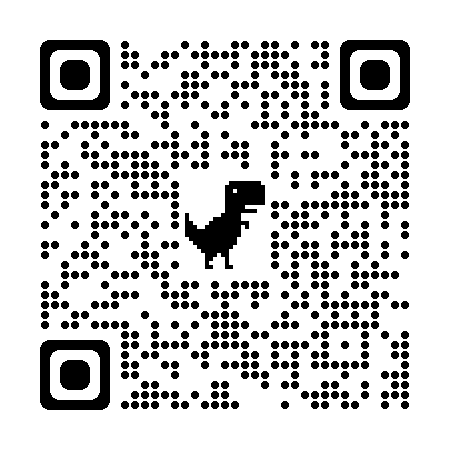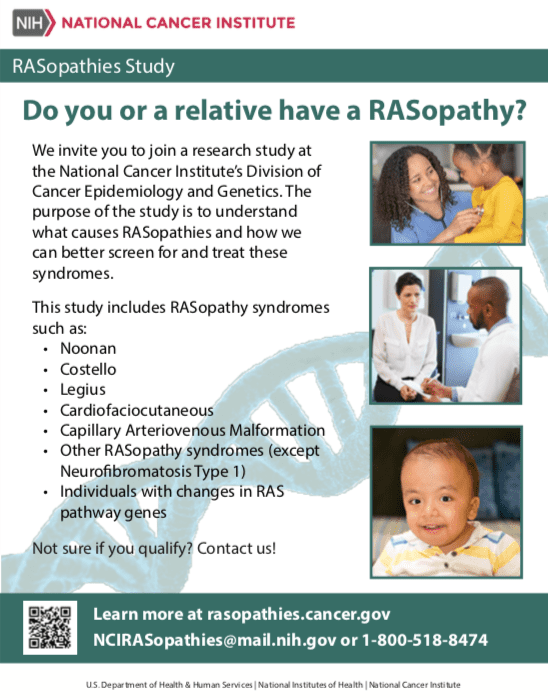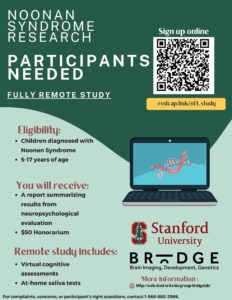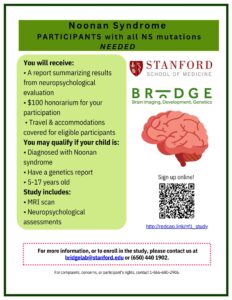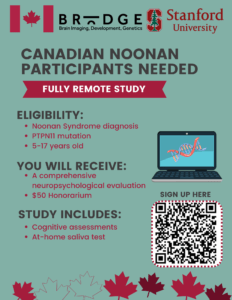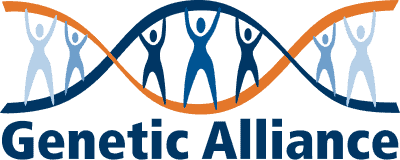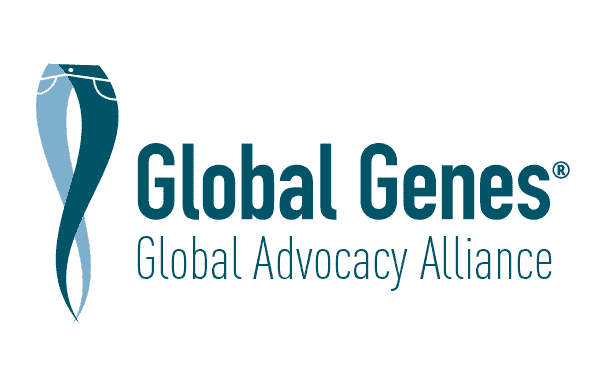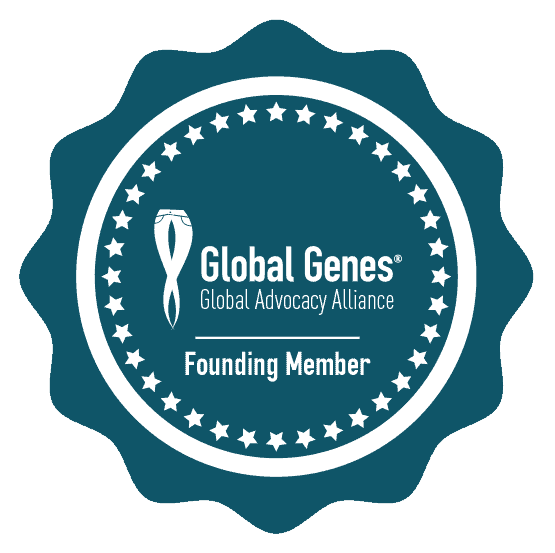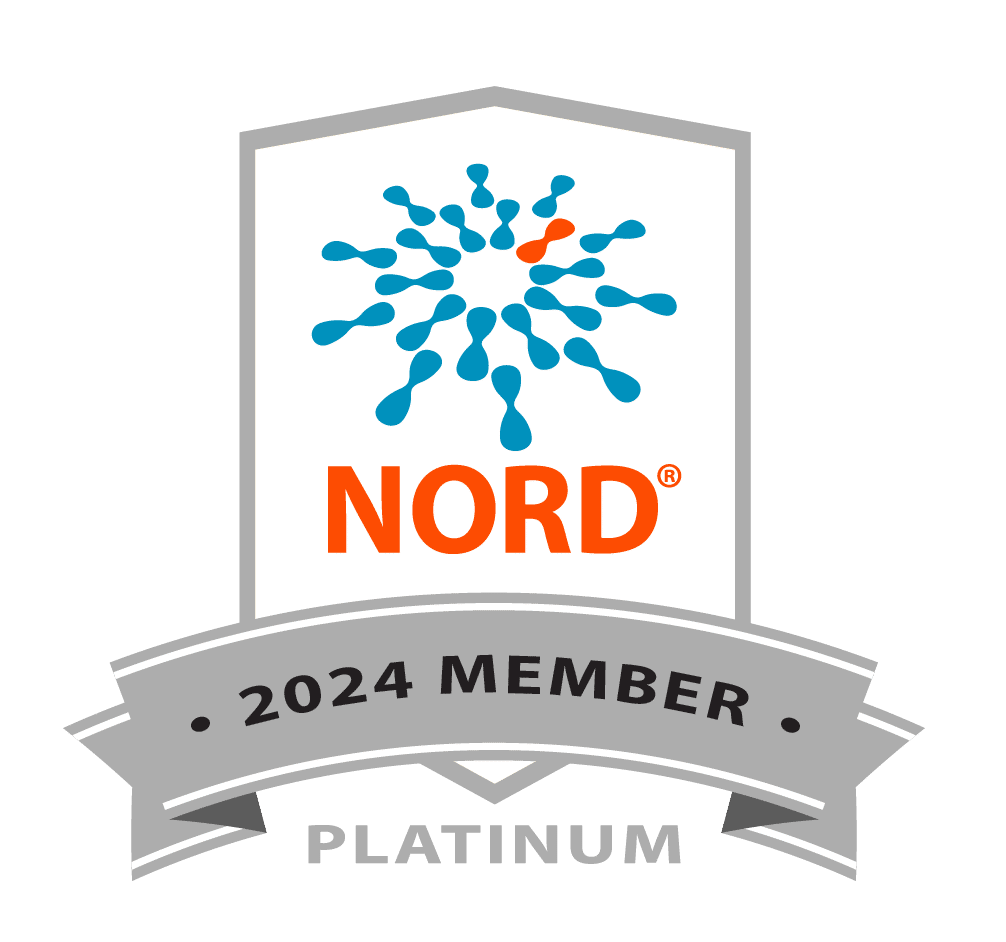SURVEY ** Tethered Cord Syndrome ** SURVEY
Rare Diseases
As is sometimes the case in rare diseases, observations made by patients and caregivers leads to novel medical discoveries. In 2017, Patricia Weltin and Annette Maughan through a Facebook post Annette made, realized that Annette’s son was showing signs of Tethered Cord Syndrome(TCS). Annette’s son, Glenn, has KBG Syndrome, a disease in which TCS was not considered a comorbid syndrome. As doctors had missed many of Glenn’s TCS symptoms, Patricia and Annette created a survey of common TCS symptoms and surveyed members of the KBG Foundation’s patient’s private Facebook group. The results showed that there was a high proportion of KBG patients exhibiting signs of TCS. They brought the results to Dr. Petra Klinge, one of the world’s leading experts in TCS. Dr. Klinge was intrigued by the results and presented them at the Chiari & Syringomyelia Foundation 3rd Annual CSF Disorders Symposium at Brown University’s Warren Alpert Medical School in June of 2018. In January 2023, in partnership with Dr. Petra Klinge, Dr. Pankaj Agrawal, et.al, an original article regarding TCS as a comorbid of KBG Syndrome was accepted for publication by the American Journal of Medical Genetics.
Tethered Cord Syndrome:
Tethered cord syndrome (TCS) is a condition in which excess strain of the spinal cord occurs due to its fixation to surrounding spinal tissues. The syndrome is characterized by sensory and motor deficits, leg pain and weakness, bladder and bowel dysfunction, and orthopedic malformations, with scoliosis being the most prevalent orthopedic complication of TCS. Radiographically, spinal cord tethering often presents as a low positioned conus medullaris below or at the L2/3 disc space, but TCS also may be radiographically occult.
Data Collection:
Rare disease patients or caregivers will be asked to complete an online survey that would indicate the presence or absence of specific clinical findings associated with neurocutaneous signs established in TCS including information of magnetic resonance imaging findings if available and urodynamic test results in the setting of bladder dysfunction. Participant sex and age are requested along with whether the patient had been diagnosed with TCS and any relevant medical history. Data will be anonymized before analysis.
Study Goals:
As a result of of the KBG study, a similar online survey was presented to the rare disease community. TCS appears to be more prevalent in the rare disease population than previously thought. Working with non-profit leaders, each rare disease in which TCS is suspected or diagnosed will be asked to participate in the survey. Results will be analyzed and diseases where clinical findings suggest further investigation into TCS will move toward an original article to be submitted for publication. TCS is often overlooked and/or clinical findings are ignored or misinterpreted. Published findings of TCS in a rare disease is important for a swift and correct diagnosis.
TSC Survey Link:
https://www.surveymonkey.com/r/VXCWTGX
KBG Syndrome Original Article:
https://onlinelibrary.wiley.com/doi/abs/10.1002/ajmg.a.63128
Dr. Petra Klinge, MD, PhD Professor of Neurosurgery Alpert Medical School, Brown University, Attending Neurosurgeon and Director Research Center and Clinic for Cerebrospinal Fluid Disorders Rhode Island Hospital, Providence RI
Dr. Pankaj Agrawal, MD, Chief of Neonatology, University of Miami Jackson Health, Chair, Project Newborn, Professor of Pediatrics and Genetics. Visiting Professor Harvard Medical School and Boston Children’s Hospital
Patricia Weltin, CEO Beyond the Diagnosis, Patient Advocate
National Institutes of Health, National Cancer Institute
Natural History Study of RASopathies
Survey
The Amalia Children’s Hospital of the Radboud University Medical Center in the Netherlands is doing a survey:
STUDY: Eating problems with NS spectrum disorders to find (better) treatment.
WHO: Parent of a NS child, or someone with NS yourself (does not matter what age), we would very much like to invite you to participate in our survey.
Even when feeding or eating problems were not present. The more people respond, the better the extent of eating problems will become clear.
It will take approx. 10 minutes. There is one wide table providing an overview per year, may be better to use a tablet or laptop.
The survey will stay open until the 1st of March 2022. **EXTENDED**
If the link does not open, please, copy the link to another window.
https://data.castoredc.com/survey/2X2XHAVS
All information will be processed anonymously and securely.
If you have any questions, you can email directly at Dagmar.Tiemens@radboudumc.nl
United Kingdom
Manchester
- CLOSED: A Registry Study to Characterise Genetic and Pathway Biomarkers in Noonan Syndrome and Other RASopathy Patients – for more information click here.
- CLOSED: CASPER – The Cognitive and Social Profiling: Exploring Rasopathies (CASPER) study is a research study into a group of conditions called the RAS-MAPK pathway disorders. Go to http://www.bbmh.manchester.ac.uk/casper/AboutCASPER/ for a description.
If you would like to speak to the team at the University of Manchester for more information about the research, please contact;
Ami Brooks
ami.brooks@manchester.ac.uk
tel: +44(0)161 306 7953
If you would like to speak to the team at the Manchester Centre for Genomic Medicine, please contact;
Emma Burkitt-Wright
emma.burkitt-wright@manchester.ac.uk
tel: +44(0)161 701 5105
United States
California
Palo Alto University
Participate in one of the first studies looking at the relationship between quality of life, behavior, and social cognition in RASopathy syndromes – for Noonan syndrome, and now open to any RASopathy.
Study Includes:
• Parent online survey (~1hr)
• Child online survey & assessment (~1 hr)
• Parent phone survey (~30 minutes)
Who can participate?
• Any child with a RASopathy diagnosis and their family
• Ages 8-18
• English-speaking
Additional Information
• Families from outside the US are welcome to participate!
• For children with limited reading levels, families may choose for only parents to participate.
• For families with limited internet access, we are happy to mail paper surveys.
Click here for flyer.
Contact:
Paige Naylor, Doctoral Candidate
rasopathies.pau@gmail.com
1 (504) 881-3925
This study is sponsored and monitored by the Palo Alto University IRB. The research team includes Wendy Packman, PhD, JD and Paige Naylor.
University of California, San Francisco
CLOSED: The RasCal Study – RASopathy Associated Traits – for a description click here and scroll to the last page, or here to go to the UCSF page with detailed information.
Contact:
Lauren Weiss, PhD
University of California, San Francisco
(415) 476-6988
lauren.weiss@ucsf.edu
http://anp.ucsf.edu/research/studies/rascal
Stanford University
Seeking participants for several studies
Study of brain and cognitive development in boys and girls with Noonan syndrome or NF1
Compensation for travel and participation are provided!
Contact:
Dr. Tamar Green’s Lab
http://web.stanford.edu/group/bridgelab
Email: bridgelab@stanford.edu or (650) 440-1902
Kansas
CLOSED Survey: Healthcare information dissemination to and use by parents and/or caregivers of individuals with a rare disease.
My name is Ting Wang. I am a parent of a child with RASopathies mutation. My daughter Amelia is currently 3 years old. I am also a Ph.D. student at the School of Library and Information Management at Emporia State University in Emporia, KS USA.
I am conducting my PhD dissertation to learn about healthcare information dissemination to and use by parents and/or caregivers of individuals with a rare disease. I am interested in this study because I was struggling with acquiring healthcare information for caring for Amelia. I hope I can inform healthcare professionals about what information we need through doing this study that future parents of children with a rare disease will not struggle the same issue that I was facing.
If you are a family member of someone with a rare disease, will you please participate in this research? Please click on this link to the survey https://www.surveymonkey.com/r/TingWang
This survey will most likely take you about 10 minutes to complete. When you have completed the survey, your participation in this study will end. I will share the results with you by sending you a website link to the results documents. The survey has been approved by Institutional Review Boards about studying human subject. The survey will be closed on Aug 27th, 2021
I sincerely thank you very much for your participation in this project!
Massachusetts
CLOSED: Hypertrophic Cardiomyopathy Study for Individuals with Noonan Syndrome with Multiple Lentigines / LEOPARD syndrome – for more information, click here.
Contact:
Jane Messere, RN, Research Nurse
Children’s Hospital, Boston
(857) 218-3628
jane.messere@cardio.chboston.org
Minnesota
Strengths and difficulties of children with genetic and neurodevelopmental differences
University of Minnesota, Twin Cities and University of Wisconsin, Madison
Approved for use by UMN IRB Effective on 6/20/2019
IRB Study Number: STUDY00006323
Researchers at UMN and UW are seeking research participants for a unique study on behavioral strengths and challenges of children ages 3-17 with any of the following diagnoses:
Autism Spectrum Disorder (ASD) Cardiofaciocutaneous (CFC) Syndrome Costello Syndrome (CS)
Fragile X Syndrome (FXS) Neurofibromatosis Type 1 (NF1) Noonan Syndrome (NS)
The purpose of the study is to learn how to help children build on their strengths and overcome challenges. By studying children with several different conditions, we can better understand the unique strengths and needs of children with each of these genetic or neurodevelopmental differences.
To complete this study, parents/caregivers will be asked to complete a 15-20 minute survey about their child’s day-to-day behavior. Families will be entered into a drawing for prizes:
1 Grand prize: $100 gift card
1 Second prize: $50 gift card
2 Third prizes: $25 gift card
For a flyer, click here
Contact:
Alli Foy, MS and Rene Pierpont, PhD, LP
University of Minnesota Medical Center
Email: SDQ@umn.edu
Phone: (608) 709-9067
Missouri
St. Louis – Washington University
The Neurofibromatosis Type 1 Patient Registry (NPR1) is currently recruiting both adults and children with NF1 for a childhood brain tumor study. The goal of this study is to identify differences in medical, social, demographic, and birth characteristics of children who develop childhood brain tumors compared to those who do not develop these tumors. We are looking for individuals with NF1 who either (1) HAVE previously been diagnosed with a brain tumor younger than age 18 years or (2) HAVE NEVER had a brain tumor. For more information click here: https://nf1registry.
Completing the online questionnaire/registration will take approximately 30 minutes of your time.
Contact:
The Neurofibromatosis Type 1 Patient Registry
Email: nf1registry@
Phone: (314) 935-3888
https://nf1registry.wustl.edu/
New York
A Registry Study to Characterize Genetic and Pathway Biomarkers in Noonan Syndrome and Other RASopathy patients – for more information, click here.
Contact:
Meghan Mac Neal, MS, CGC, MPH
Icahn School of Medicine at Mount Sinai
Meghan.macneal@mssm.edu
~~~
Pennsylvania
UPMC Children’s Hospital of Pittsburgh
April 2020
Participate in a research study evaluating the characteristics of brain and spinal cord tumors (cancers) that occur in children, adolescents, and adults with all types of RASopathies except for Neurofibromatosis type 1 (NF1).
Study includes 1) permission to get and review clinical and imaging information from medical records obtained as part of standard of care at your local hospital 2) permission to use leftover tumor samples (if available from previous surgeries) and to collect some saliva
Contact:
Dr. Alberto Broniscer, MD MS
Tel: 412-692-5056
email: alberto.broniscer@chp.edu
More info HERE
Children’s Hospital, Philadelphia (CHOP)
A sleep research study to help develop a new pediatric sleep health survey to better understand how sleep health relates to RASopathies.
For parents of individuals with a RASopathy to complete a 10-15 minute online survey. Affected children between the ages of 8 and 17 may be able to participate in the study by answering the survey, as well. Anyone who understands English is eligible to participate (it is not limited to the United States).
Link to the consent and survey: https://redcap.chop.edu/
Contact:
Anna de la Motte, Study Coordinator
delamottea@email.chop.edu
(215) 590-3196.
Washington DC
Children’s National Hospital, Dr. Andrew Dauber
Fall 2020
Research study testing an experimental medication: Vosoritide for Selected Genetic Causes of Short Stature
Webinar about the trial is Here
Flyer with more information is Here
Contact:
Email: tmccarthy@childrensnational.org
adauber@childrensnational.org
Tel: 202-476-6894
~~~
Clinical trials pertaining to any of the RASopathies will be drawn from external sites Clinicaltrials.gov and clinicaltrialsregister.eu – stay tuned!
~~~
If you are a researcher who is conducting a clinical trial, please contact us.

